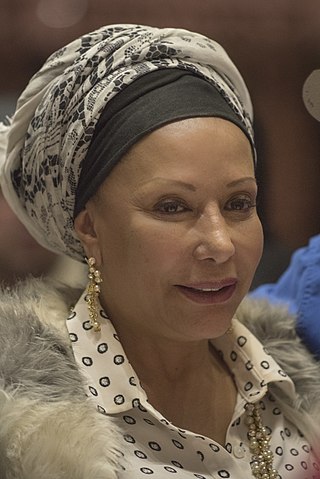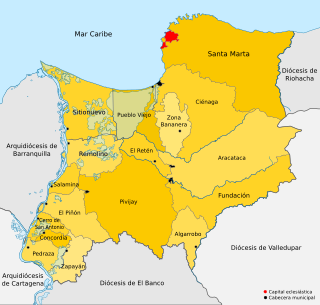| |||||
| Decades: | |||||
|---|---|---|---|---|---|
| See also: | |||||
Events in the year 2016 in Colombia .
| |||||
| Decades: | |||||
|---|---|---|---|---|---|
| See also: | |||||
Events in the year 2016 in Colombia .


The history of Colombia includes the settlements and society by indigenous peoples, most notably, the Muisca Confederation, Quimbaya Civilization, and Tairona Chiefdoms; the Spanish arrived in 1492 and initiated a period of annexation and colonization, most noteworthy being Spanish conquest; ultimately creating the Viceroyalty of New Granada, with its capital at Bogotá. Independence from Spain was won in 1819, but by 1830 the "Gran Colombia" Federation was dissolved. What is now Colombia and Panama emerged as the Republic of New Granada. The new nation experimented with federalism as the Granadine Confederation (1858), and then the United States of Colombia (1863), before the Republic of Colombia was finally declared in 1886; as well as constant political violence in the country. Panama seceded in 1903. Since the 1960s, the country has suffered from an asymmetric low-intensity armed conflict, which escalated in the 1990s, but then decreased from 2005 onward. The legacy of Colombia's history has resulted in a rich cultural heritage; while varied geography, and the imposing landscape of the country has resulted in the development of very strong regional identities.

The Revolutionary Armed Forces of Colombia – People's Army is a Marxist–Leninist guerrilla group involved in the continuing Colombian conflict starting in 1964. The FARC-EP was officially founded in 1966 from peasant self-defense groups formed from 1948 during the "Violencia" as a peasant force promoting a political line of agrarianism and anti-imperialism. They are known to employ a variety of military tactics, in addition to more unconventional methods, including terrorism.

The National Liberation Army is a Marxist–Leninist guerrilla group involved in the continuing Colombian conflict, which has existed in Colombia since 1964. The ELN advocate a composite communist ideology of Marxism-Leninism and liberation theology. In 2013, it was estimated that the ELN forces consisted of between 1,380 and 3,000 guerrillas. According to former ELN national directorate member Felipe Torres, one fifth of ELN supporters have taken up arms. The ELN has been classified as a terrorist organization by the governments of Colombia, the United States, Canada, the European Union and Venezuela's National Assembly.

The Roman Catholic Archdiocese of Trujillo is an archdiocese located in the city of Trujillo in Peru.

Juan Manuel Santos Calderón is a Colombian politician who was the President of Colombia from 2010 to 2018. He was the sole recipient of the 2016 Nobel Peace Prize.

The Roman Catholic Archdiocese of Asunción is an ecclesiastical territory or diocese of the Roman Catholic Church in Paraguay.

Central Cemetery of Bogotá is one of the main and most famous cemeteries in Colombia located in Bogotá. Houses several national heroes, poets and former Colombian presidents. It was opened in 1836 and was declared National Monument in 1984. Some of the sculptors of the mausoleums are Tenerani and Sighinolfi.

Piedad Esneda Córdoba Ruiz is a Colombian lawyer and politician who served as Senator of Colombia from 1994 to 2010. A Liberal Party politician, she also served as Member of the Chamber of Representatives of Colombia for Antioquia from 1992 to 1994.

The Roman Catholic Diocese of Santa Marta is a diocese located in the city of Santa Marta in the Ecclesiastical province of Barranquilla in Colombia.

The Roman Catholic Archdiocese of Cartagena is an archdiocese located in the city of Cartagena in Colombia.

The Roman Catholic Archdiocese of Villavicencio is an archdiocese located in the city of Villavicencio in Colombia.
Jaime Alberto Parra Rodríguez was one of the FARC negotiators in the peace process with the government of Juan Manuel Santos, years before he replaced alias "Mono Jojoy" and Iván Ríos. in the Secretariat of the Revolutionary Armed Forces of Colombia (FARC) and currently participates in the Political Council of the Comunes party as an advisor for Solidarity, Human Rights and Prisoners.

Colombia–France relations are the bilateral relations between Colombia and France. Both nations are members of the OECD and the United Nations.
Gregorio Garavito Jiménez S.M.M. was a Colombian bishop of the Catholic Church. At the time of his death, he was one of oldest Colombian Catholic bishops.
The following lists events that happened during 2014 in Colombia.

The 2015 Nobel Peace Prize was awarded to the Tunisian National Dialogue Quartet for "its decisive contribution to the building of a pluralistic democracy in Tunisia in the wake of the Jasmine Revolution of 2011".
The Colombian peace process is the peace process between the Colombian government of President Juan Manuel Santos and the Revolutionary Armed Forces of Colombia (FARC–EP) to bring an end to the Colombian conflict, which eventually led to the Peace Agreements between the Colombian Government of Juan Manuel Santos and FARC-EP. Negotiations began in September 2012, and mainly took place in Havana, Cuba. Negotiators announced a final agreement to end the conflict and build a lasting peace on August 24, 2016. However, a referendum to ratify the deal on October 2, 2016 was unsuccessful after 50.2% of voters voted against the agreement with 49.8% voting in favor. Afterward, the Colombian government and the FARC signed a revised peace deal on November 24 and sent it to Congress for ratification instead of conducting a second referendum. Both houses of Congress ratified the revised peace agreement on November 29–30, 2016, thus marking an end to the conflict.

The 2016 Nobel Peace Prize was awarded to the President of Colombia Juan Manuel Santos "for his resolute efforts to bring the country’s more than 50-year-long civil war to an end, a war that has cost the lives of at least 220,000 Colombians and displaced close to six million people." The conflict is the longest running war, and last remaining guerrilla struggle, in the Americas. The Nobel Peace Prize is awarded annually to those who have "done the most or the best work for fraternity between nations, for the abolition or reduction of standing armies and for the holding and promotion of peace congresses". The announcement was made on 7 October at a press conference at the Nobel Peace Center, and the formal award ceremony took place on 10 December at the Oslo City Hall.

Juan Manuel Santos's term as the 32nd president of Colombia began with his first inauguration on August 7, 2010, and ended on August 7, 2018. Santos, a center-right leader from Bogotá, took office after a landslide victory over the leftist leader. Antanas Mockus in the 2010 presidential election. Four years later, in the 2014 presidential election, he narrowly defeated the Democratic Center candidate Óscar Iván Zuluaga to win re-election. Santos was succeeded by right-wing leader Iván Duque, who won the 2018 presidential election.